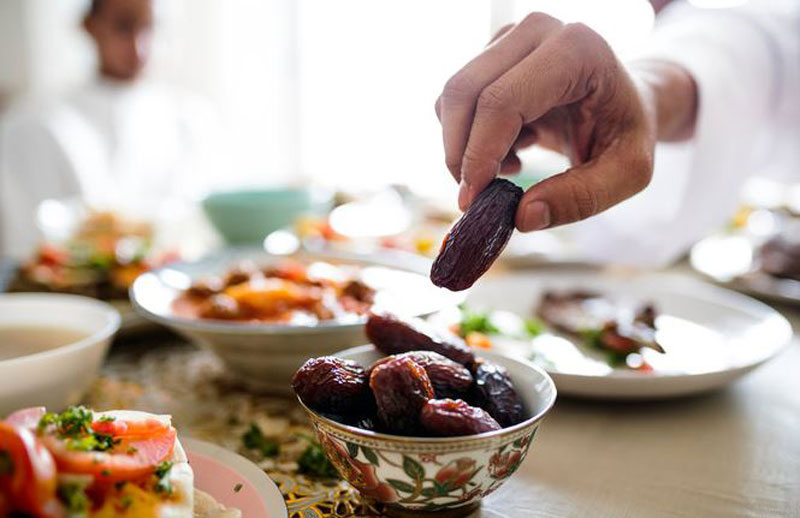Everything has a dua, including dua when eating, and when breaking the fast. This is the month of Ramadan, every time we break our fast, it is sunnat for us to recite the dua iftar or iftar prayer.
When breaking the fast, we are sunnat reading basmallah, and eating sweet foods. Then we recite a special iftar dua. After reading the dua iftar, then just enjoy the various dishes that have been prepared.
Do You Recite Iftar Prayers?
If not, your fast is still valid, but you have lost a virtue because reading prayers is liked in the Shari’a. It is better, before you enjoy various iftar dishes, read the iftar prayer first.
What is the ruling on reciting the iftar prayer?
The ruling of reciting the dua iftar is sunnat. You get a reward if you recite it and you don’t get a sin if you leave it.
Because the ruling is sunnat, then we should be able to get the reward when breaking the fast by not leaving the prayer during iftar.
Also see: Dua After Adhan: Arabic, Transliteration and Translation
What foods are recommended for breaking the fast?
Breaking the fast is sunnat with something sweet and not processed with fire. You can break your fast with sweet foods such as dates, papaya, sweet mango, and other sweet foods. But Rasulullah SAW broke his fast with three dates.
So, we are sunnat to break the fast with dates, but if there are no dates, you can take other sweet fruits.
Why does it have to be sweet?
During a day of fasting, we lose a lot of energy, so with sweet foods we can replenish our energy and our bodies are fresh again.
How About Dua Iftar?
Regarding the iftar prayer, there are several versions as in several hadith narrations as quoted in Nahdhatul Ulama website.
Here we see the reading of the iftar prayer.
بِسْمِ اللَّهِ الرَّحْمَنِ الرَّحِيمِ
اللَّهُمَّ لَكَ صُمْتُ وَ عَلَى رِزْقِكَ أَفْطَرْتُ وَ عَلَيْكَ تَوَكَّلْتُ
Allaahumma Laka S’umtu Wa A’laa Rizqika Aft’artuwa A’layka Tawawkkaltu
The Meaning: O my Allah, for Thee, I fast, and with the food Thou gives me I break the fast, and I rely on Thee.
There is a hadith narrated from the companions of the Prophet Muhammad. Mu’adz bin Zuhrah:
كَانَ إِذَا أَفْطَرَ قَالَ : اللَّهُمَّ لَكَ صُمْتُ، وَعَلَى رِزْقِكَ أَفْطَرْتُ
“The Messenger of Allah when breaking fast, he prayed: ‘O Allah, only for You we fast and for the sustenance that You have given us to break our fast,” (Narrated by Abu Dawud).
Meanwhile, in the hadith narrated by Abdullah bin ‘Umar, the Messenger of Allah recited the following prayer:
كَانَ رَسُولُ اللهِ صلى الله عليه وسلم، إِذَا أَفْطَرَ قَالَ : ذَهَبَ الظَّمَأُ وَابْتَلَّتِ الْعُرُوقُ، وَثَبَتَ الأَجْرُ إِنْ شَاءَ اللهُ
“The Messenger of Allah when he broke his fast, he prayed: ‘The thirst has disappeared and the veins are wet and the reward is fixed, God willing,” (Narrated by Abu Dawud).
In the book of Fath al-Mu’in, it is stated that the best way to recite the dua iftar is to recite the prayer as in the hadith narrated by Mu’adz bin Zuhrah above.
Also see: Dua Qunoot in Salah (Dua Qunuts)
While the dua iftar lafadh as narrated by Abdullah bin ‘Umar, is read when we break our fast with water.
ويسن أن يقول عقب الفطر: اللهم لك صمت، وعلى رزقك أفطرت ويزيد – من أفطر بالماء -: ذهب الظمأ، وابتلت العروق، وثبت الاجر إن شاء الله تعالى.
“It is Sunnah to read the prayer after breaking the fast “Allâhumma laka shumtu wa ‘alâ rizqika aftharthu” and for those who break their fast with water, the prayer is added: “Dzahabadh dhamâ’u wabtalatl-‘urûqu wa tsabata-l-ajru insyâ-a-Llâh ,” (Fath al-Mu’in, juz 2, p. 279).
